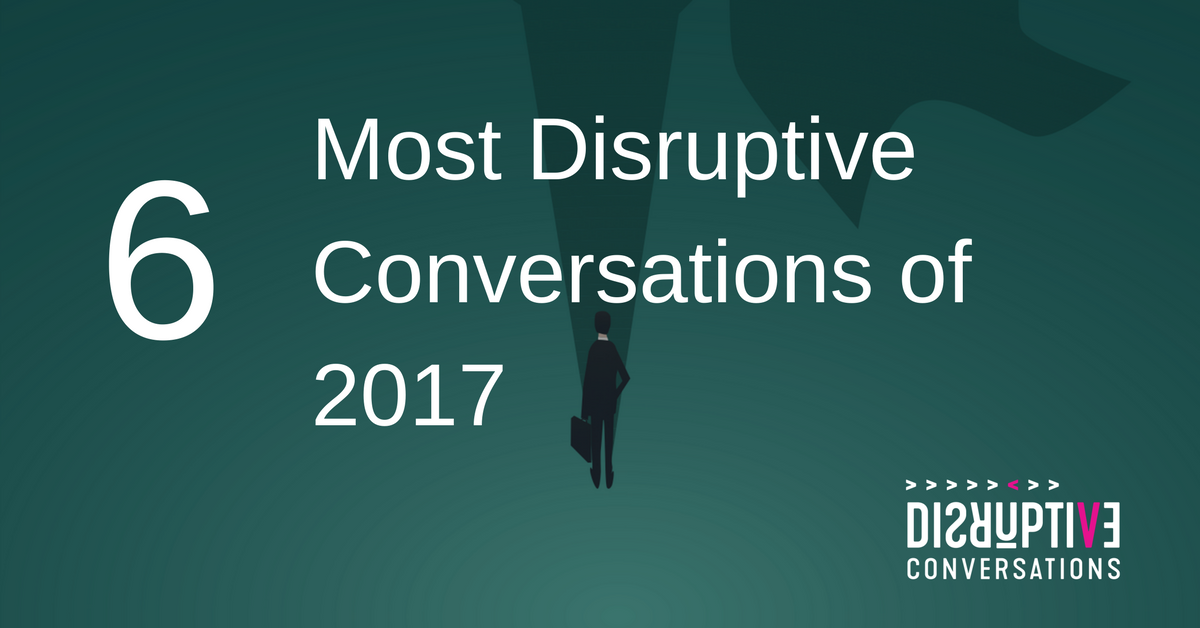The 6 most Disruptive Conversation of 2017
In 2017, I hit a major milestone with my podcast Disruptive Conversations. Some time ago, I decided I was going to have as many Disruptive Conversations as I could, and publish them as a weekly podcast. In October of 2017, I published episode 50 and decided to take a break from publishing the weekly episodes. Since then I have recorded some exciting new podcasts to be released as season two in March this year.
In reflecting on the promise of 2018, I struggled to select the six most disruptive conversations of Season one. I even cheated with a few special mentions. What is striking is that I noticed I have bias towards conversations that explore the deep recesses of humanity. These are the conversations that I thought were most disruptive, and other listeners might identify other episodes as being more disruptive. If so, please share the episode you found to most disrupt your own thinking and why. Hope you enjoy my six most Disruptive Conversations for 2017:
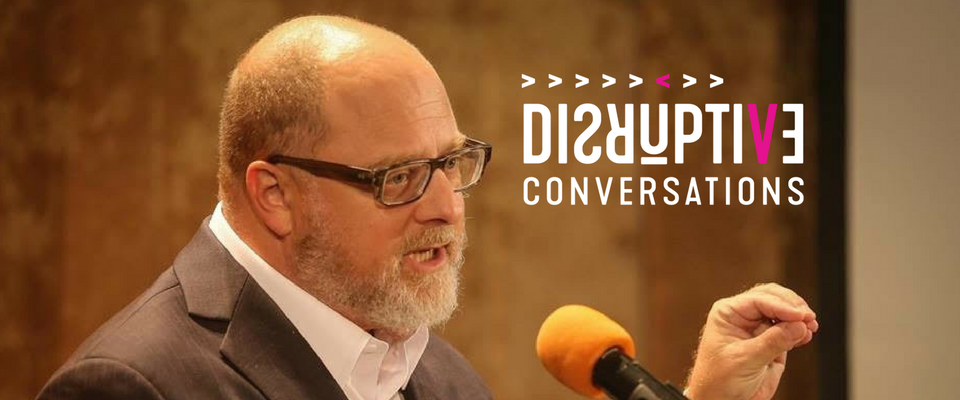
1. Adam Khanne: Our enemies can be our greatest teacher.
This is perhaps one of the most disruptive conversation of 2017, since it asks us to do such an uncomfortable thing. Adam asks listeners to consider the notion that we can work with people we consider to be our enemies. He challenges the notion that harmony, agreement, and compliance are prerequisites for working together. Adam asks us stretch into our discomfort and consider “Collaborating with the Enemy”, also the title of his book. Link to the episode.
It is important to acknowledge that my podcast episode with Zak Ebrahim, author of the book, “Son of a terrorist”, also makes the case for walking in the path of the enemy. Although our conversation comes at the topic from a different lens, it is also a disruptive conversation worth exploring. Link to the episode.
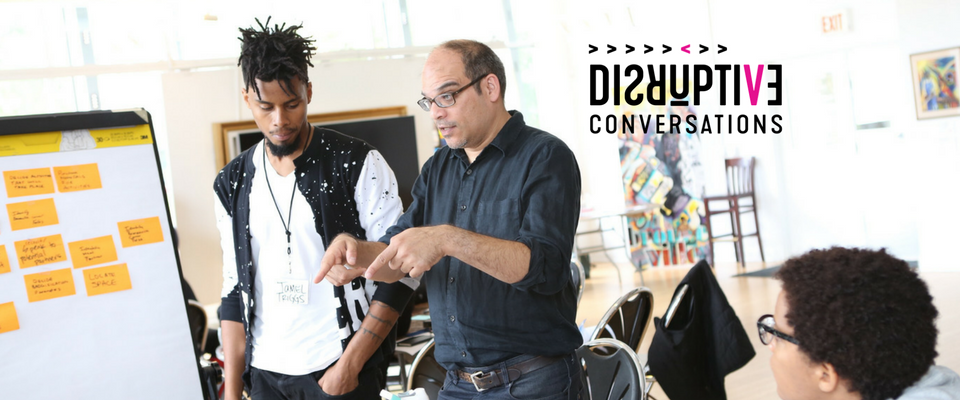
2. Zaid Hassan: The tragedy of strategic planning.
In this episode, Zaid Hassan challenges the notion of strategic planning. For many of my listeners, this was an incredibly disruptive conversation and for good reason. Most organizations have a strategic plan, the trouble is that their strategic plans also sit on a shelf somewhere collecting dust. Not only do people not use strategic plans effectively, if at all, Zaid argues that they do not work in a nonlinear world. Strategic plans assume the world is linear and it is not. In this episode, Zaid referenced his favorite quote as being:
“If progress, planning & reason have led to the failed systems that litter our landscapes, might speculation & dreaming be our only way forward?”- Victor Papanek
I happen to agree with Zaid, and tend to embrace a complexity lens in my own approach to organizational change, but in a world where strategic planning forms so much of the dominant narrative, calling it tragedy counts as disruptive conversation. Almost routinely, every few years one leader is going to decide to embark on the process of strategic planning. He suggests, that perhaps we ought to consider an approach to making a difference in the world that not only assumes nonlinearity, but also matches it in process and method. Link to the episode.

3. Thordis Elva: Responsibility, forgiveness and reconciliation.
The premise of a disruptive conversation, is that disruptive conversations redefine the stories we tell and the scripts we hold about the way our organizations, sectors, and systems work. One of the most disruptive conversations featured on my podcast in 2017 was with Thordis Elva. I first met Thordis at TEDWomen, after she had given a talk standing next to a man, Tom, who admitted to having once raped her. She and Tom, stood side-by-side and described a story of rape, reconciliation and trauma. What was most striking for me, was that I knew the hours of practice it took to deliver a TEDTalk, which meant these two spent a lot of time together. In that talk they humanized Tom, the perpetrator; they showcased the trauma that he experienced, and in the podcast, she told a very human story of someone who had once sexually assaulted her. She argued that rape is not committed by monsters, but it is committed by people. It is a most radical of ideas to find compassion for someone who caused so much pain and this is why I picked this conversation as one of the most disruptive conversations of 2017. Click here to listen to the episode.
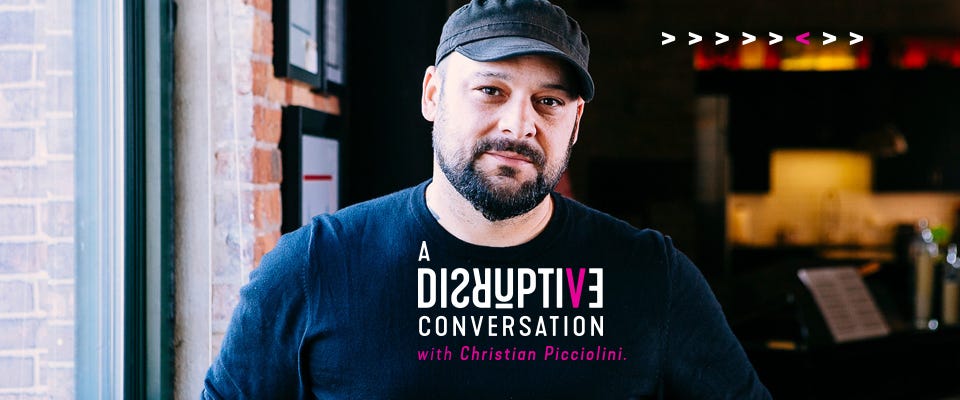
4. Christian Picciolini: Is compassion and empathy at the heart of ideological change?
Personally, one of the most disruptive conversation I had for 2017 was talking a former head and cofounder of a white supremacy group Christian Picciolini. Firstly, Christian is one of the nicest most empathic people I have ever interviewed. He made the point that people who sign up for these hate groups are in search of community. For many of these young men, hate groups offer them a sense of purpose and meaning. Words we do not usually associate with hate groups. What was so disruptive about this conversation, was that it reminded me that all of us, not matter who we are … we are all in search of connection. We all need community. Two things really stood out for me was that Christian talks about how his own way out of hate was through compassion and empathy. This insight fuels his approach to helping current and former hate group members transition out of these communities. He operates on two principles:
1) Listening first
2) Do not to try to talk about ideology.
If you wish to connect with people who are insecure, lonely or marginalized, address those needs first and not your perceived differences. My conversation with Christian was not only disruptive as a black male talking to a former skin head, but his approach to transforming the lives of these men is radically loving and provides hope to see someone go from such hate to so much love. Link to the episode.
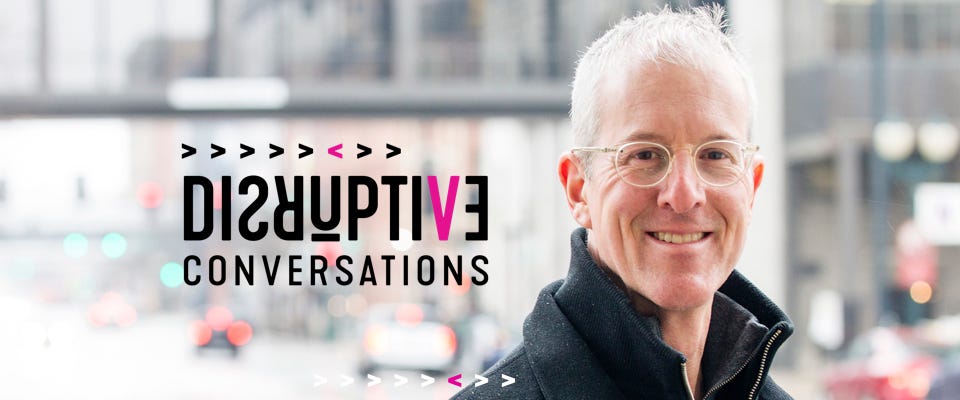
5. Jeff Speck: What if I told you walkability was a disruptive concept?
After reading his book, Walkable City: How Downtown Can Save America, One Step at a Time”, I was convinced that Jeff Speck is onto something. Since then I have read many other authors who have made similar arguments, but my conversation with him both in his writing and on the show disrupted how I understood the importance of walkability in cities. Many cities around the world have surrendered their cities to cars, and the relatively simple idea of walking and walkability is disruptive. For many people the idea of life without a car is unthinkable, for others who live city centers it makes little sense to own a car, the way we have built the modern city makes our cities less livable and the idea of a car centric world is so pervasive that I had to include Jeff as one of my most disruptive conversations for 2017. To learn more about how walkability can transform cities listen to this episode.
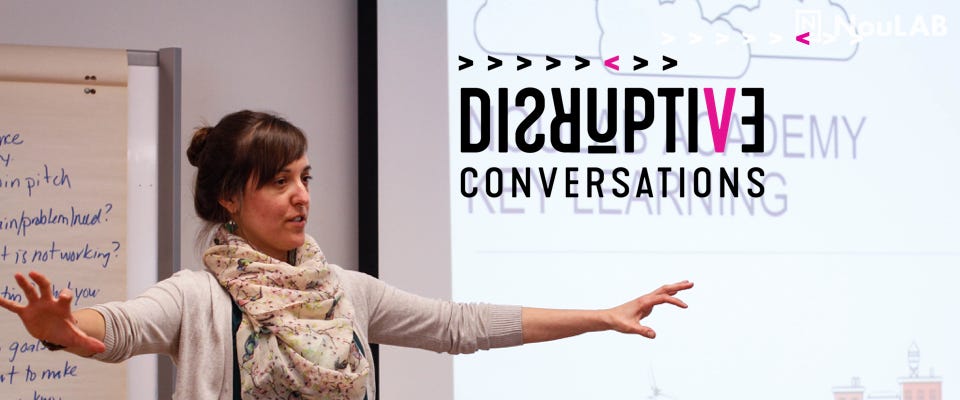
6. Amanda Hachey: What does it mean to be anti-silver bullet?
What do you do when there is a misalignment between what you are trying to do and the work you are actually doing? In this disruptive conversation with Amanda Hachey we explore what it means to be anti-silver bullet. She makes the point that there are no silver-bullet solutions yet so many of our ways of working in the world assume that there is an answer to the problems we face. This conversation had many disruptive moments, but the ones I found most powerful where the simple but disarming questions;
· What is the work that you are trying to do?
· What is the work that you are doing?
I have used these questions many times in 2017. Each time I ask these questions, it is usually disarming to the person I am speaking with. In most cases it is causes a moment of pause or reflection and that is why it falls into the category of disruptive conversation of 2017. To listen to the episode with Amanda Hachey follow this link.
Special mention goes to Nick Scott, who works with Amanda. In his episode, Think big, start small, and work together, Nick puts forward the very disruptive idea that innovation is possible within the public sector. You can listen to his episodes here.
